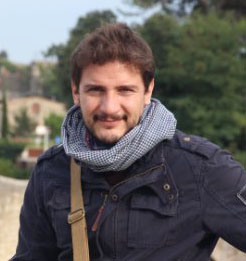Institute of Molecular and Cellular Biology, UPR 9002, Strasbourg Translational regulation of APOBEC3G mRNA by Vif requires its 5′UTR and contributes to restoring HIV-1 infectivity.Sci Rep. 2016;6: 39507.doi:10.1038/srep39507 Guerrero S, Libre C, Batisse J, Mercenne G, Richer D, Laumond G, Decoville T, Moog C, Marquet R & Paillart JC.
Cv
Santiago Guerrero, 32 ans, a effectué sa thèse portant sur le rôle de la protéine Vif du VIH-1 dans la régulation traductionnelle du facteur de restriction APOBEC3G (A3G), une cytidine désaminase dont l’action hypermutatrice est létale pour le virus. Son travail effectué sous la direction de Jean-Christophe Paillart (Université de Strasbourg, CNRS, Architecture et Réactivité de l´ARN, UPR 9002, IBMC), décrit que la protéine Vif du VIH-1 régule négativement la traduction d’A3G par un mécanisme dépendant de la région 5'-UTR. Ces résultats pourraient être importants dans le développement de nouvelles stratégies d’inhibition de la réplication virale qui ciblerait spécifiquement l’interaction de Vif avec l’ARNm d’A3G. Santiago a rejoint le groupe du Fátima Gebauer au sein du « Centre for Genomic Regulation (CRG) » (Barcelona, Spain), où il étudie le rôle des protéines de liaison à l'ARN dans la progression métastatique du cancer. Dans le but de développer des collaborations scientifiques entre l’Europe et son pays d’origine, l’Equateur (http://www.kawsaybiomed.com/home.html), il a déjà établi des projets collaboratifs avec le « Centro de Investigación de Genética y Genómica (CIGG), UTE » (Quito, Ecuador) dont l’objectif est de comprendre les bases génomiques du cancer dans des populations métissées.
Contact
This email address is being protected from spambots. You need JavaScript enabled to view it.
PhD in Molecular and Cellular Biology
Postdoctoral Research Scientist at Center for Genomic Regulation
Vice-president of Kawsay Biomedical Society
C/Dr. Aiguader 88, PRBB Building
08003 Barcelona, Spain
Résumé de l'article
The essential HIV-1 viral infectivity factor (Vif) allows productive infection of non-permissive cells expressing cytidine deaminases APOBEC3G (A3G) and A3F by decreasing their cellular level, and preventing their incorporation into virions. Unlike the Vif-induced degradation of A3G, the functional role of the inhibition of A3G translation by Vif remained unclear. Here, we show that two stem-loop structures within the 5′-untranslated region of A3G mRNA are crucial for translation inhibition by Vif in cells, and most Vif alleles neutralize A3G translation efficiently. Interestingly, K26R mutation in Vif abolishes degradation of A3G by the proteasome but has no effect at the translational level, indicating these two pathways are independent. These two mechanisms, proteasomal degradation and translational inhibition, similarly contribute to decrease the cellular level of A3G by Vif and to prevent its incorporation into virions. Importantly, inhibition of A3G translation is sufficient to partially restore viral infectivity in the absence of proteosomal degradation. These findings demonstrate that HIV-1 has evolved redundant mechanisms to specifically inhibit the potent antiviral activity of A3G




